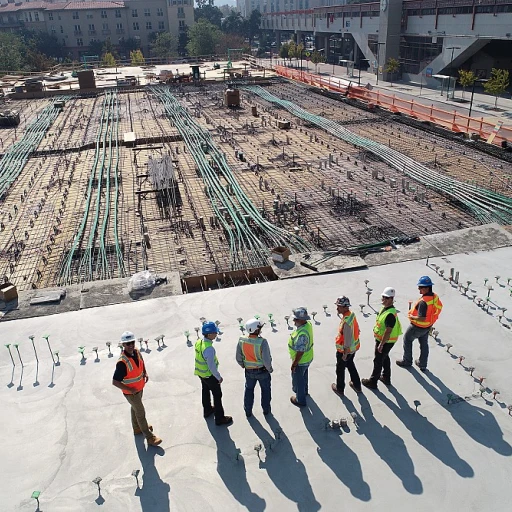The Role of Technology in Shaping Workplace Culture
The Influence of Technology on Contemporary Work Environments
The modern landscape of workplace culture is heavily influenced by the rapid advancements in technology. The digital era has brought with it a paradigm shift in how organizations operate, encouraging a blend of flexibility and connectivity that was previously unimaginable. This transformation is not just about the tools we use, but also how we shape our interactions and mindsets in a professional setting.
In contemplating the impact of technology, it's essential to view it through the lens of both practical tools and spiritual practice. Technologies like social media or collaborative platforms have reshaped how we share, communicate, and collaborate. They invite contemplation on how these digital interactions blend with ancient practices of mindfulness and community-building.
Moreover, technology encourages a rethink of our cultural beliefs and practices in the workplace. It offers a unique opportunity to cultivate a contemplative culture where there’s room for personal development and mindfulness meditation. Some might find the fast-paced nature of digital tools overwhelming, yet there lies a potential benefit in integrating them with contemplation practice methods.
Practicing attention in the digital sphere is like the ancient routine of washing dishes—mundane yet rewarding when approached mindfully. Workers can develop a cultural contemplative practice by finding time for reflection amidst the digital chaos, thus fostering a conducive environment for innovation and creativity.
As we consider the role of technology in shaping workplace culture, issues related to privacy policy and digital ethics become crucial. These elements are intertwined with how organizations balance the benefits of contemplating cultural practices against potential intrusions of privacy. Importantly, acknowledging the role of technology in fostering an inclusive work environment is vital for sustainable and ethical practices.
To see how workplace badges further intertwine with our evolving work culture, explore more on their evolution.
Diversity and Inclusion: A Cultural Imperative
Embracing Mindfulness for Inclusive Workplace Harmony
Contemplation and mindfulness have become significant pillars in nurturing cultural diversity and inclusion within workplace environments. These practices are not merely contemporary trends but rather ancient approaches that assist in developing one's inner self and understanding the deeper connections between employees of diverse backgrounds.
By integrating mindfulness meditation into the daily work routine, organizations create an inclusive atmosphere where employees feel respected and valued. The practice of contemplation can bridge cultural gaps, allowing people to pay attention to the essentials of life and reflect on shared beliefs. This approach also breaks down barriers, encouraging personal development and cross-cultural understanding.
Contemplative practices, such as reading a book or meditation, help individuals reflect on the nature of their work and their role within the company. By fostering a culture of inclusivity, employees are more likely to engage positively, leading to benefits for both individual life and the broader community. Such a culture encourages acceptance, open-minded interaction, and addressing any preconceived notions.
Amidst a fast-paced work environment, taking time to contemplate enables employees to appreciate the rich tapestry of diverse ideas and perspectives. Embracing cultural diversity shows organizations' commitment to fostering a community where everyone can share ideas freely and contribute meaningfully.
Moreover, organizations that implement contemplation practices will find that employees develop a stronger sense of belonging, ultimately enhancing teamwork and employee productivity. This cultural transformation aligns with the organization's privacy policy and builds a foundation of spiritual practice, promoting not only ethical work practices but also long-term sustainability.
For companies striving towards cultural inclusivity, it is essential to effectively introduce mindfulness elements into their daily operations. This can be as simple as incorporating time to reflect during meetings or creating quiet spaces within the office designated for individual meditation. As companies look to the future, embracing this concept of contemplation will inevitably lead to a harmonious workplace, one that values each individual and celebrates cultural differences.
For further insights on fostering cultural diversity and its impact on workplace harmony, read more on
understanding the meaning of VTO in the future of work.
Balancing Flexibility and Structure
Finding the Right Balance Between Flexibility and Structure
In today's fast-paced work environment, the contemplation of finding a balance between flexibility and structure is more relevant than ever. Many organizations are beginning to value the benefits of a flexible culture, which allows employees to manage their time in a way that suits their personal and professional needs. However, the challenge remains in ensuring this flexibility doesn't overshadow the need for a certain level of structure that maintains operational efficiency. Organizations are faced with the task of creating a culture where both flexibility and structure coexist, allowing employees to thrive.
Mindfulness is a key practice in achieving this balance. Engaging in mindfulness meditation allows employees to pay attention and find moments of calm and clarity in their hectic routines. By cultivating inner stillness and understanding through such contemplative practices, people can enhance their focus and productivity, leading to better cultural integration at work.
One might say that the time to reflect on personal and organizational goals is like finding time to read a book or practice a spiritual ritual. For instance, a contemplation practice like washing dishes mindfully gives us time to contemplate and allows us to find a sense of peace and purpose, as described in many ancient cultures. It is essential to integrate these concepts into modern workspace practices like social media usage and privacy policy governance.
The time reflect on achieving this balance is not just about productivity. It is also an opportunity to design a workplace culture that supports the long-term well-being of employees. As companies navigate the complexities of this cultural transformation, they must also consider the ethical implications of their practices and how they contribute to sustainability in the broader community. This underscores the significance of seeking contemplation ancient methods in modern workplace practices for personal development.
Establishing clear structures gives employees a framework within which to operate, while flexibility provides the room to adapt to their changing needs and those of their families. It's about achieving a mutual understanding between employer and employee, promoting both efficiency and satisfaction.
For further exploration of how cultural factors play a significant role in workplace dynamics, you can explore insights into the
evolving perks at work which shed light on what the future of a balanced work environment might entail.
Employee Well-being and Mental Health
Cultivating a Culture of Well-being
In the fast-paced world of work, the importance of fostering employees' well-being and mental health has never been more critical. As businesses contemplate cultural imperatives, such as diversity and inclusion, it becomes equally essential to prioritize an environment where individuals feel supported and valued. Cultivating inner resilience through mindfulness meditation and contemplation practices can offer numerous benefits to employees and the organization as a whole.
Stress and burnout are real challenges in today's workplace culture. Organizations can no longer simply pay attention to productivity metrics without considering the toll on their employees' mental health. By incorporating mindfulness meditation into everyday work life, employees gain the tools to manage stress and remain focused amidst distractions. This contemplative approach can help people skip content related to stress-inducing thoughts, fostering a more peaceful work atmosphere.
Moreover, cultural shifts towards embracing spiritual practices, such as meditation and contemplation, can lead to a more harmonious community at work. Sharing these practices creates a culture where individuals feel encouraged to take time to reflect and contemplate life beyond the corporate walls. Encouraging employees to practice contemplation could include offering quiet spaces, organized reflection sessions, or even integrating contemplative practices into team meetings.
The benefits of contemplation extend beyond individual well-being, contributing to personal development and enhancing the community's collective wisdom. Taking the time to contemplate one's beliefs, goals, and work-life balance can lead to profound insights and solutions to complex issues facing both individuals and the organization.
As organizations strive to balance flexibility and structure, the incorporation of ancient practices like contemplation allows for periods of pause and reflection in an otherwise hectic schedule. The culture of encouraging employees to take "time contemplate" is a powerful alternative to constantly prioritizing social media or other attention-diverting activities.
To create a supportive environment that prioritizes mental health, leaders must also engage in the practice. Through contemplation, they can embrace sustainable and ethical practices while affirming their commitment to a workplace culture that honors the humanity behind each role. Organizations that succeed in these endeavors are likely to find an engaged and resilient workforce capable of thriving in the evolving future of work.
Transformative Leadership in Evolving Workspaces
The future of work demands leaders who can navigate cultural transformations within organizations. As our workplaces continue to adapt, the role of leadership becomes crucial in forging a path towards a cohesive and inclusive culture. Leaders are not only responsible for guiding their teams through complex challenges but also in cultivating an environment where contemplation and innovation can flourish.
Leadership today requires a delicate balance between time-tested practices and novel cultural dynamics. The integration of mindfulness and contemplation practices is increasingly seen as a pathway to better leadership. Engaging in activities such as mindfulness meditation or setting aside time to contemplate can provide leaders with an opportunity to reflect deeply on workplace culture and their team's needs.
Leaders who practice contemplation and encourage their teams to do the same can foster a community that values inner growth alongside professional development. This matter not only enhances personal development but also aligns with a broader cultural shift towards mindfulness. Such practices help leaders and employees alike to pay attention to their beliefs, thoughts, and actions.
Adopting contemplative practices can lead to numerous benefits. Leaders who dedicate time to reflect and engage in spiritual practice often find themselves better equipped to address the nuances of cultural transformations. They are more likely to prioritize employee mental health and well-being and create a work environment that embraces diversity and inclusion. This approach allows leaders to make intentional, informed decisions that resonate with long-term organizational goals and societal values.
Moreover, the concept of contemplation isn't limited to individual introspection. It extends to organizational frameworks where culture is continuously examined and refined. By embedding contemplative practices into an organization's cultural fabric, leaders can effectively guide their teams amidst rapid changes and technological advancements. This cultural contemplation can ultimately lead to an inclusive, sustainable, and ethically responsible workplace.
In this fast-paced world, where the demands on modern workforces grow, leaders who take the time to wash dishes or read a book during a contemplative moment can set a precedent for a balanced, thoughtful approach to work and life. It's a gentle reminder that sometimes, the most profound insights come when we take a step back from our busy schedules to simply breathe and reflect.
The future of workplace culture lies heavily in the hands of those who lead. By embracing a more mindful approach, leaders have the power to not just transform the workplace, but also to empower their teams to thrive in an ever-evolving cultural landscape.
Sustainability and Ethical Practices
The Importance of Sustainable and Ethical Practices in Workplace Culture
The evolution of workplace culture necessitates a closer look at how sustainability and ethical practices intertwine with our professional lives. As companies navigate the fast-paced world, the time spent contemplating their impact on the environment and society becomes increasingly crucial. Contemplation, in this sense, is not a leisurely activity, but a fundamental practice to incorporate in daily operations.
With the rise of environmental awareness, organizations are re-evaluating their footprints and beliefs, acknowledging the need for sustainable practices. A culture that values ethical standards and sustainable growth fosters not only a healthier community but also contributes to employees' personal development. In this environment, practicing mindfulness becomes an essential tool for both individuals and corporate entities.
Mindfulness meditation and the intentional practice of contemplation are more than just spiritual practices—they are strategies that encourage employees and leaders alike to focus on the cultural fabric of the organization. Paying attention to the environment in which they operate, companies can cultivate an inner sense of responsibility and duty toward maintaining ethical standards. This shift in perspective yields numerous benefits including increased employee well-being and enhanced trust between people and the organization.
Integrating these practices into the corporate structure requires time and dedication. Just like the well-honed practice of reading a book for leisurely contemplation, organizations must dedicate time to reflect on their cultural essence. The concept of contemplation is not just ancient; it's timeless—its benefits touching every aspect of life and work. As such, employees are provided with the opportunity to grow both professionally and personally as they align themselves with practices that prioritize ethical bonds over immediate profits.
Furthermore, as companies foster cultural transformation through technology and leadership, sustainability becomes a binding agent, reinforcing the core values of the workplace. The act of honoring ethical commitments and more sustainable practices could be as simple as the mindful act of washing dishes—paying attention and being deliberate about our choices.
For a company to thrive in the contemporary world, incorporating a contemplation culture into the workplace is not only beneficial but necessary. It serves as a continual reminder to practice attention towards ethical innovations, ultimately sustaining a company’s longevity and social responsibility.














